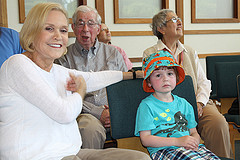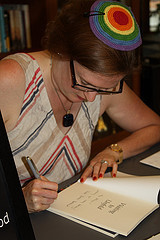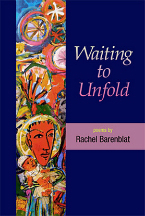Rachel Barenblat's Blog, page 186
June 17, 2013
What we learn from Balaam about blessing
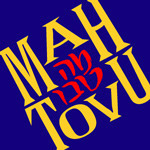 "How good are your tents, O Jacob; your dwelling-places, O Israel!" We sing these words at the beginning of morning prayer as part of Mah Tovu. This is a quotation from this week's Torah portion, Balak; the words come from the foreign prophet Balaam, who was hired by Balak to curse the Israelites.
"How good are your tents, O Jacob; your dwelling-places, O Israel!" We sing these words at the beginning of morning prayer as part of Mah Tovu. This is a quotation from this week's Torah portion, Balak; the words come from the foreign prophet Balaam, who was hired by Balak to curse the Israelites.
Balaam seems to have a standing relationship with God, which is unusual. In the Biblical mindset, foreign prophets have relationships with their own foreign gods (this is the henotheistic view -- our God is the right one, but there are other gods out there) or perhaps they are deluded altogether (this is the monotheistic view -- our God is the only God; there are no others), but it's rare for the Torah to show us a prophet of another tradition who's on speaking terms with the One.
Twice Balak sends messengers to Balaam to persuade him to come and curse the children of Israel, and each time Balaam says: I can't do or say anything contrary to the command of my God Adonai. Balaam speaks directly with God twice. Eventually God says to him: okay, fine, go. But when you get there, you're going to say what I tell you to say. That refrain is repeated by the angel of God who temporarily stands in Balaam's way the next morning.
When Balaam gets to the mountaintop, he instructs the king to make lavish sacrifices, and then goes off alone to commune with God before offering any words. God becomes manifest to Balaam and tells him what to say, and instead of curses, Balaam offers blessings. Not once, but thrice. Balak, exasperated, finally says "don't curse and don't bless" -- don't say anything! But Balaam can't help offering blessings. Balak sends him away in a huff, thoroughly exasperated that his plot has been foiled.
The story is practically slapstick. Balaam repeatedly tells the king that he can't offer curses when God wants blessings, but the king refuses to listen, dragging the prophet from mountain to mountain as though he might offer a different proclamation from differnet ground. (And of course there's the talking donkey who sees the angel of God when the prophet does not. That one never gets old.)
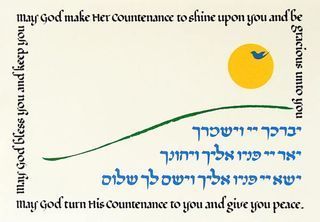 But behind the slapstick I find a powerful message: when we're attuned to God, we offer blessings. Even when we're primed, contextually, to think in terms of curses. Even when those around us are prompting us to respond with unkindness and vitriol. One who is listening for the presence of the Holy One of Blessings will respond with blessings, not curses.
But behind the slapstick I find a powerful message: when we're attuned to God, we offer blessings. Even when we're primed, contextually, to think in terms of curses. Even when those around us are prompting us to respond with unkindness and vitriol. One who is listening for the presence of the Holy One of Blessings will respond with blessings, not curses.
This isn't a modern text or context. But we can extrapolate from it. There are places (both online and off) where hatred and vitriol are cultivated. There are people who seem to delight in saying awful things about others. They are modern-day Balaks, and they behave in ways designed to rouse our energies of anger and hatred in response.
It is easy to get drawn-in to that worldview and to respond to their hatred with hatred of our own. But Balaam is our reminder that there is another path. Take deep breaths, open yourself to God's presence, and instead of offering anger, offer blessing. Unveil your eyes, as Balaam did, and find something to bless. This is a high level of spiritual practice. But if a foreign prophet was capable of it (even in the Biblical paradigm), then surely so are we.
The image of the priestly blessing is from Cymbal Designs.
Previous years' commentary on Balak
2006: On blessings and curses
2007: Prophetic (comedic) speech
2008: Balak [Torah poem]
June 16, 2013
The red heifer, life and death, and the story
Here's the d'var Torah I offered yesterday morning at my shul for parashat Chukat. (Cross-posted to my From the Rabbi Blog.)
In this week's Torah portion, God tells Moses and Aaron how to cleanse the tum'ah, the "ritual impurity," which comes from contact with death. Take a red cow without blemish, on which no yoke has been laid. Give it to Elazar, the priest. Bring it outside the camp and slaughter it. Burn it there along with hyssop, cedar, and red thread.
The ashes from this fire, mixed with water, make a potion called mei-niddah, "waters of lustration." Anyone who comes into contact with a dead body must be cleansed with the waters of lustration. Otherwise that person cannot enter the Temple precincts, and will be cut off from the people.
Contact with death confers tum'ah. And yet the ashes of the red heifer, which is itself dead, confer taharah; they make one pure again. In the Zen tradition, one might call this a koan, a teaching-riddle. In our tradition this is the classic example of a chok, a divine commandment which doesn't make rational sense.
The sages of our tradition spend a lot of time on this one! Yochanan ben Zakkai argued that the ashes have no intrinsic power. They purify because this is a divine commandment, and following the mitzvot refines the human soul and makes one pure.
In other words: spiritual purity arises when we understand ourselves to be in relationship with God, and therefore do what God asks of us even when we don't understand it. Through accepting ol malkhut mitzvot, the "yoke of the mitzvot," we also accept ol malkhut shamayim, the "yoke of heaven."
I find meaning in that idea, but this passage still challenges me. We've spent almost two thousand years in a post-Temple era. We've replaced the avodah which the priests used to perform with avodah she-ba-lev, the service of the heart. We offer prayers and teshuvah, not barbecue and ashes. The ritual of the red heifer feels uncomfortably like magic.
I think the ritual of the red heifer isn't something we can understand through logic. Try reading it as though it were poetry. What are the words and images which recur in this passage? Blood; red; fire; water; ashes; pure.
While sacrifices often involved bulls, this one was a cow. A female, capable of creating life. The cow, morever, was red. Along with the cow, the priests were instructed to burn wool dyed scarlet: again, the color of blood. Torah teaches that "The life of every creature is in its blood." (Lev. 17:14) The red heifer is a symbol of life.
She is taken outside the boundaries of the community, and there she is slaughtered, life becoming death. She is burned -- fire, another symbol of death. The resulting ash is mixed with water: death, in liquid solution. But when one has a brush with death, it is the waters of niddah, this solution of ashes, which reconnect one with life.
It's as though death magnetizes us, aligning us with death and dying instead of with life and living. The way to undo that magnetization (said the Torah) was to come into contact with death a second time -- through these special ashes, mixed with water. Paradoxically, the second contact with death aligned us again with life. Maybe this practice says to us: when you encounter death, don't try to imagine it away or pretend that it's something else. Encounter it wholly. The only way out is through.
"Take to yourself a red cow, whole, unblemished." To Rabbi David Wolfe-Blank (z"l) this means:
When you become aware that your nature is wild, and you notice your flaws, the negative side of being a wild animal, your hard-wiring, your problems with boundaries, your destructiveness and disorganization -- also take into yourselves that you are as God made you, perfect in your present state at this moment, whole, unblemished.
For Rabbi Wolfe-Blank, each of us is the red cow: animal and chaotic, but also perfect and whole, just as God made us.
Another interpretation. This commandment tells us to take a perfect red cow who has never been subject to a yoke. In sacrificing this unyoked animal, we experience the yoke of the mitzvot and the yoke of heaven. The cow has never been yoked, but we are. Performing this ritual reminded us of that. And now that we no longer perform the ritual, our reminder is the story.
June 13, 2013
Affirmation
"All shall be well, and all shall be well, and all manner of thing shall be well." -- Julian of Norwich
Even when the rains fall
sheeting down the windows
for days without end.
Even when factories explode,
when gun deaths rise
like flood waters,
when long-held prejudices
prove impossible to dislodge,
when there's no way around
admitting that what hurts
isn't going away.
For every wound, a salve.
For every insult, kindness.
Someone presses ten dollars
into an empty hand.
A bag of clothes appears
on the porch just as you wonder
how to afford new sizes.
Someone is writing a story
just for you, hoping
it will find its reader.
Tomorrow the sun will rise
and you will be loved.
It isn't enough. It's enough.
Julian of Norwich was a Christian mystic in the fourteenth century of the Common Era.
There was a chemical plant explosion in Louisiana yesterday. And here's Slate's tally of gun deaths since Newtown.
On the brighter side: several writers in the SF/F community are matching donations made to the Carl Brandon Society, "a non-profit group dedicated to increasing the 'racial and ethnic
diversity in the production of and audience for speculative fiction.'"
Jane Goodall's Reasons for Hope. See also this list of Kindness Ideas.
June 11, 2013
Sharing mother poems with a crowd
I didn't expect some 25 people to show up at the synagogue on Sunday for a celebratory reading from Waiting to Unfold. It was a beautiful sunny day; I had braced myself for the possibility that only my parents (visiting from Texas) and one or two congregants would be there! And that would have been okay. Back in the Inkberry days, we certainly hosted plenty of poetry readings with tiny crowds. But our small sanctuary felt full of people. It was a real joy to see so many familiar faces -- and a few unfamiliar ones, too.
Reading these poems aloud is still an intense and powerful experience for me. Each one clicks me immediately back into the moment of its composition, connecting me with realities and emotions to which I would otherwise have lost access.The poems are so intimate that some part of me always wonders whether they'll be too much for listeners. But so far, people seem to be moved by the poems, and to find resonance in them, even if they aren't parents themselves (though maybe especially if they are.)
At this reading, our son -- who had just woken up from a nap, hence the slightly glazed look in his eye -- sat quietly the entire time, listening. I don't know how much he understood; I suspect that much of the poetry went over his head. But it was moving to me to have my mother there, and my husband, and our son, especially given this collection's subject matter. Afterwards, when people clapped, our son joined them in applauding, noting approvingly, "We're clapping so loud!"
And then people asked wonderful questions. Were you ever shy about sharing something so personal? When did you start writing poetry? (I let my mother answer that one.) What was it like, writing a poem each week? Was writing mother poems different from writing Torah poems, and if so, how? What are you working on now? Who do you hope will read these poems, and what's that like for you? And so on. And then there were cookies (thank you Roberta!), and cheese and grapes (thank you David and Joanne!), and I signed books, and it was thoroughly lovely.
My deep thanks go to everyone who attended the North County reading, who listened so attentively, and who asked such terrific questions afterwards during the Q-and-A. Thank you for being here and for helping me celebrate this new book!
Photos by Jane Shiyah.
Waiting to Unfold costs $13.95 (US, CAN) / £9.10 / €10.66 and is available at Phoenicia Publishing and on Amazon (and Amazon UK and Amazon Europe) -- though publisher and author earn more if you buy it directly from Phoenicia. Still: buy it wherever works for you, I'm just happy that people want to read it!
June 8, 2013
Who separates, and connects, Shabbat and week
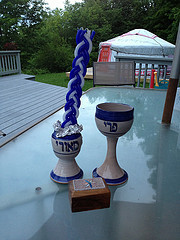 It's not something I often do, by myself. I don't know why not. It only takes a few moments. At this season and at this latitude, of course, it happens well after putting our son to bed; in deepest midwinter it happens in the afternoon, well before even his early supper. I love that when we live attuned to the seasons around us, we experience that pendulum shift. The challenge, of course, is to enjoy what we have now without fearing what comes later; to enjoy what comes later without yearning for what we have now...
It's not something I often do, by myself. I don't know why not. It only takes a few moments. At this season and at this latitude, of course, it happens well after putting our son to bed; in deepest midwinter it happens in the afternoon, well before even his early supper. I love that when we live attuned to the seasons around us, we experience that pendulum shift. The challenge, of course, is to enjoy what we have now without fearing what comes later; to enjoy what comes later without yearning for what we have now...
Havdalah makes me think of the end of the various retreats I went on as part of my rabbinic school journey: the end of a week at the old (or new) Elat Chayyim, the end of smicha students' week, the end of the ALEPH Kallah, the end of a week of DLTI. Our learning always culminated in a Shabbat which honestly felt like a foretaste of the world to come. And then we would gather for havdalah, standing in a big circle -- outdoors, if the season permitted it -- and the flame of the havdalah candle held aloft would streak our faces with gold.
I always used to cry during havdalah at those retreats. I would cry because the end of Shabbat meant that our retreat was ending; that my precious time with my community of fellow travelers, students and teachers alike, was waning; because as much as I looked forward to returning to my ordinary life back home, every time I parted from those beloved friends (and our shared paradigm, our shared language, our shared love of learning and of Torah and of God) felt like tearing myself away from something I wasn't sure how to live without.
Of course, the gift of havdalah is that it ushers in a new week, full of new joys and new adventures. And at the end of each week, Shabbat returns -- if we're willing and able to take notice. The flywheel keeps turning. Shabbat leads to week, which leads to Shabbat, which leads to week. Shabbat wouldn't be so special if it weren't experienced against the backdrop of weekday; but the weekday too has its ordinary pleasures.
There's something magical and bittersweet about havdalah, about marking the end of Shabbat with these words and these intentions. A last taste of Shabbat before it goes away for a week. The wine, a remembrance of how just last night we made kiddush. The fire, which gleams and glints on our fingernails, reminding us that we are beings made of light. The spices, which pre-emptively revive us lest we faint away at the removal of the second soul which tradition says we borrow during Shabbat. The blessing for God who separates between -- and, in the version I favor, also connects between -- Shabbat and week. (I learned that variation some years ago.)
Once the candle fizzles out in the wine, there's a palpable feeling of something missing. Singing Eliahu Hanavi and Miriam HaNeviah stirs my heart. What would it feel like, if the entire cosmos could live in Shabbat consciousness all the time? If cruelty and suffering could cease, if we could live in a world truly redeemed? God only knows. But at least we have the opportunity to dip into that feeling once a week, if we're willing and able to take it. And even when we sorrow at its departure, we know it will return.
Shavua tov / a good week, a week of peace; may gladness reign, and joy increase.
Related:
Distinctions (a poem for havdalah), 2013
As Shabbat wanes (2009)
June 7, 2013
Worth reading: Ethan Zuckerman's Rewire
Pardon me for a moment while I kvell. My husband Ethan Zuckerman has a new book out: Rewire: Digital Cosmopolitans in the Age of Connection, published by WW Norton. Here's how Norton describes it:
We live in an age of connection, one that is accelerated by the Internet. This increasingly ubiquitous, immensely powerful technology often leads us to assume that as the number of people online grows, it inevitably leads to a smaller, more cosmopolitan world. We’ll understand more, we think. We’ll know more. We’ll engage more and share more with people from other cultures. In reality, it is easier to ship bottles of water from Fiji to Atlanta than it is to get news from Tokyo to New York.
In Rewire, media scholar and activist Ethan Zuckerman explains why the technological ability to communicate with someone does not inevitably lead to increased human connection. At the most basic level, our human tendency to “flock together” means that most of our interactions, online or off, are with a small set of people with whom we have much in common. In examining this fundamental tendency, Zuckerman draws on his own work as well as the latest research in psychology and sociology to consider technology’s role in disconnecting ourselves from the rest of the world.
For those who seek a wider picture—a picture now critical for survival in an age of global economic crises and pandemics—Zuckerman highlights the challenges, and the headway already made, in truly connecting people across cultures. From voracious xenophiles eager to explore other countries to bridge figures who are able to connect one culture to another, people are at the center of his vision for a true kind of cosmopolitanism. And it is people who will shape a new approach to existing technologies, and perhaps invent some new ones, that embrace translation, cross-cultural inspiration, and the search for new, serendipitous experiences.
I am most certainly biased -- I've read the book many times over in draft form; besides which, I'm awfully fond of its author (today's our fifteenth wedding anniversary!) -- but I think this book is fantastic.
As it happens, I'm not alone in that. Publisher's Weekly gave it a starred review, calling it a "fascinating and powerful reflection on what it means to be a citizen of the world in the Internet age" and praising its "imaginative and inventive reflections [which] offer a resourceful guide to living a connected life with intention and insight." And sources ranging from The LA Times to Foreign Policy call it one of the top books to read this year.
Rewire combines a thoughtful and nuanced exploration of what it means to be a citizen of the world today, and of the places where our habitual blinders keep us from connecting across borders and cultures, with engaging personal stories -- some from Ethan's own experiences, some from his voluminous research. (I'm particularly fond of the one about Arnel Pineda. We both became big Pineda fans when he was researching that story; we even bought a Journey Live in Manila dvd!) And the book also offers thoughts about the choices we could make in order to shape a better, and more interconnected, world. At its heart, this book is about people, and about the amazing richness to which we have access when we connect with each other across our differences.
In my life and work this takes a somewhat different shape -- cconnecting with people across religious differences, both within Judaism and across the broader religious (and non-religious!) spectrum -- but this kind of bridging and connection is a passion which Ethan and I share. It's one which we hope to pass on to our son. And I love knowing that someday, when our son is old enough to read it and understand it, we can press this book into his hands and say, "This is what your dad was working on when you were born, and he wrote it for you."
danah boyd writes:
A compelling account of an intertwined global world, Ethan Zuckerman’s Rewire
makes you fall in love with a wide range of cultural practices and
peoples. As he explains the importance of understanding not just how
information flows but also how people connect, he lays a foundation for
rethinking what global citizenship can and should be.
You can buy it on Amazon (hardcover; Kindle) or Powells (hardcover). If you want to natter about it once you've read it, feel free to come back here and join the conversation in comments! I am so happy that this book exists -- not only because my husband wrote it, but also because I think it says important, valuable things. Here's to rewiring our world.
Join me on Sunday for poems, Q-and-A, and conversation!
This past Monday I gave my first public reading from Waiting to Unfold, at Knesset Israel synagogue in Pittsfield after their kosher hot lunch. I read to an avid and interested group of about 25 people, and then took questions about everything from Torah scrolls to postpartum depression. Aftewards, a pair of older ladies approached my bookselling table and told me that it had been 60 years since they had parented newborns, but that hearing my poems brought it all back. Hearing that from them was a real gift for me.
Midweek I shared a few poems at a local hospital's training about postpartum depression. (And our son came with me, which added a special spice to the evening.) That was incredibly powerful for me, too: sharing some of the poems of my postpartum journey with people who will be tasked with diagnosing and caring for women who suffer from PPD, who may be able to let them know that there is hope and that they are not alone.
And on this coming Sunday afternoon, I'll be sharing poems from the collection again:
Sunday June 9, 4pm
Poetry reading and conversation / signing / Q-and-A / plus refreshments!
Congregation Beth Israel, 53 Lois Street, North Adams
cosponsored by MotherWoman and the Berkshire County Perinatal Support Coalition
Join Rabbi Rachel Barenblat (70 faces,
Phoenicia, 2011) for a reading from Waiting to Unfold (Phoenicia, 2013),
her new collection of poems, written as weekly poems during her first
year of motherhood. Rodger Kamenetz says, "The intense observation of
the poet and the intense observation of the mother unite in a
celebration of what is new and newborn, what is intensely felt and
cherished and what is lost and mourned." Refreshments & book-signing
to follow.
CBI is my shul, and I'm honored to be sharing my poems from the bimah
there. If you haven't yet visited our beautiful sanctuary set like a
gem beside wetland and mountains, and coming to services doesn't tempt
you, come listen to some poems instead!
We'll also hear a few words from a MotherWoman representative, who will speak briefly about the work they do with new mothers across Berkshire County. Please join us!
June 6, 2013
My first poetry reading with our son by my side
By the time we find the right room, it feels as though we've taken every elevator in the hospital complex. Though once we go down the right one, and exit on floor G, I realize in a flash that I have been in this place before -- this is the floor where we took childbirth classes, an infinity ago before our son was born. "I think I've been here before," I say aloud.
"I don't think so," says our son, who is holding his pink Hello Kitty water bottle in one hand and holding my hand with the other.
"It was before you were born," I tell him.
"Ohhh," he says, meaningfully, though I'm not sure he really understands what "before you were born" means.
We're at Berkshire Medical Center to be brief special guests at a MotherWoman training for caregivers -- therapists, nurses, and so on -- who work with postpartum women. When we enter the room, it's packed. And it is the very same room where Ethan and I practiced different kinds of labor breathing.
Their time is tight and they have a lot to cover, so I'm only going to read two poems from Waiting to Unfold. Since this is a training about working with women who may have postpartum depression, I choose an early poem from the collection which was written during the worst of the depression: "Besieged." As soon as I tell them the title, a knowing hum runs around the room and someone murmurs, "that's all you really have to say." I read the poem, and I can feel them receiving it and taking it to heart.
After I finish the first poem, our son, who is sitting at a table full of therapists, says "Mommy?"
"Yes, my love?"
"Can I help you read the story?"
"You can come up here with me," I offer, and he does; he stands at the front of the room, holding my hand. I can feel the energy in the room shift. Everyone here saw me come in with a little boy, but there's something different about hearing these first-year poems with the subject of the poems standing at the podium too.
I start reading the last poem in the collection, "One Year (Mother Psalm 9)," and as I read the first few lines, I realize that I am near tears. "When the doctor brought you / through my narrow places / I was as in a dream" -- and this is the very building where the doctor did that very thing -- where I was transformed from a woman into a mother.
As I'm reading the words, time is telescoping. I'm inhabiting two spaces in time at once: his birth and those early days, and this moment, right now, standing with our tall and funny three and a half year old in front of a room of caregivers reading this poem.
And then he chimes in, over the top of the poem, "And don't forget, you have to look out for alligators!"
The whole room collapses in laughter. I manage to finish the poem, they thank us for coming, and we find our way back to the right elevator again.
June 5, 2013
Pearls from Heschel's Heavenly Torah
When Rabbi Akiva found difficult or strange language in the Torah, his ears would widen, for in his view strangeness in the text was a gateway to the discovery of the Torah's secrets. Rabbi Ishmael's goal was the integrity of the text. The Torah speaks in human language. If there is difficult or strange language in the Torah, then it is a mistake to take it at face value...
Rabbi Ishmael would teach that raz [Hebrew: "secret meaning"] is an anagram for zar [Hebrew: "bizarre"], for a text should be interpreted according to its plain meaning. But Rabbi Akiva would teach that peshat [Hebrew: "plain meaning"] is an anagram for tippesh [Hebrew: "foolish"], for the truth cannot be grasped with nothing but the tongs of plain reason...
There were thus two points of view among the Sages: (1) a transcendent point of view, comprising a method of thought always open to the higher realms, striving to understand matters of Torah through a supernal lens; and (2) an immanent point of view, comprising a method of thought modest and confined, satisfied to understand matters of Torah through an earthly lens defined by human experience.
My Wednesday morning Torah study group is reading Abraham Joshua Heschel's Torah Min HaShamayim b'Aspeklaria HaDorot / Heavenly Torah As Refracted Through the Generations (translation and commentary by Gordon Tucker.) This book was originally published in
Hebrew in three volumes, and has only recently been released in
English. I'm endlessly grateful to Gordon Tucker (whose work I had
already admired) for his work in translating this so that it is opened
up to a wider readership.
Each week, our group meets for coffee and bagels and companionship. And, after a period of chatting and catching up, a silence falls over the table, and someone says, "shall we do some learning?" And we all grab our books, and we make the blessing over Torah study, and then we dive in. We take turns reading aloud, pausing every so often for conversation and questions. We've been working our way through this book for some weeks now, and we're almost finished with the introduction. (This book is going to take us a very, very long time. But that's okay.) So far, I have to say, it's fantastic.
I'm fascinated by the binary between these two great sages, Rabbi Akiva (whose name and whose story are quite familiar -- as is his martyrdom) and Rabbi Ishmael (about whom I knew little, before we began this learning, beyond his 13 exegetical principles.) Heschel does a beautiful job of articulating their differing sets of interpretive lenses and perspectives. Often the text comes across as mouth-puckeringly tart. (Take that line about raz being an anagram for zar and peshat being an anagram for tippesh -- that made our whole table laugh out loud. Okay, maybe you had to be there. But it's really quite witty and dry.)
Rabbi Akiva, in Heschel's framing, is the transcendent thinker, the poet, the mystic, the one who insists that every letter of Torah contains hidden meaning and that our every action impacts the Holy Blessed One. Rabbi Ishmael, in contrast, is the immanent thinker, the rationalist, the one who looks for plain meaning and for intelligible practice which we can derive logically from the text.
In a certain way, Rabbi Akiva is the more literal reader of Torah, finding supernal possibilities in every letter and so cherishing the individual letters even when a phrase's meaning is unclear or strange. Rabbi Ishmael is the more relaxed reader of Torah, willing to acknowledge that some of what's in Torah is an articulation of custom rather than a holy commandment from on high, interested in the laws and practices we can build on the scaffolding of the text. One might say that Rabbi Ishmael comes to Torah with a human's-eye view, while Rabbi Akiva aspires to approach Torah with a God's-eye view.
I love Heschel's assertion that when Rabbi Akiva found something strange in Torah, his interest would be piqued (in the original language, it says his ears would open like funnels) because in his mind Torah's moments of strangeness, its oddities, its incongruities were doorways into the Torah's secrets. There's a playfulness there which appeals to me, both as a poet and as a rabbi. But I also love Heschel's articulation of Rabbi Ishmael's calm, gentle intellectual approach. The Torah is written in our own language, says Rabbi Ishmael; it's meant to be understandable and clear. There's something of the dichotomy between the Hasid and the mitnagid, here. Part of what interests me is the importance of the fruitful tension between these two age-old perspectives.
I remembered having heard someone speak about this text some years ago, so I went digging in my own blog archives, and found a post from the URJ Biennial in 2005: Rabbi Marmur on Heschel. I hadn't realized, until I reread that post just now, that some od the same quotes and ideas which I find so compelling now (my edition is becoming peppered with marginal notes and exclamation points) are the same ones I chose to include in that post eight years ago.
Anyway: this is great stuff. I'm excited to be delving into it, and I trust I'll find further pearls to share with y'all as we go. Meanwhile, I'll be over here chuckling at "the truth cannot be grasped with nothing but the tongs of plain reason" for the rest of the morning...
June 4, 2013
Korach, privilege, and striving for more
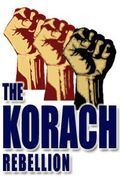 The story of Korach is a fascinating one.
The story of Korach is a fascinating one.
Right on the heels of last week's portion (the scouts, their negative report, the declaration that this generation would wander in the wilderness for forty years), Korach decides it's a good time to foment rebellion. He tells Moses and Aaron that they have no right to raise themselves above the community, because the whole community is holy. A sacrifice contest ensues, in which Aaron makes an incense offering and so do Korach and his followers. God, exasperated, tells Moses and Aaron to stand back so that God can wipe out the whole ornery community. But Moses argues that it's not fair to punish the whole community for the sins of just a few. So instead, God causes the earth to open up, and it swallows Korach and his followers.
This year I'm struck, right away, by the detail that Korach is a son of Levi. In the ancient priestly system, there were three categories of Israelites: kohen, levi, and yisrael. The Levi'im, or Levites, had the special task of performing certain kinds of priestly and sacrificial service. The Kohanim, a subgroup of Levi'im, were the Levites who were descended from Aaron directly. (Since Aaron didn't worship the Golden Calf, the story goes, he and his descendants were granted the privilege of making the sacrifices.) Everyone else fell into the category of Yisrael.
Korach's argument appears, initially, to be a communitarian one. "For all the community are holy, all of them, and Adonai is in their
midst. Why then do you raise yourselves above Adonai's congregation?" Who among us can't relate to this plaintive outcry? All the community is holy, not just the people who do the work of leadership! Maybe especially when that leadership is a hereditary privilege, open only to a certain few. It's easy for that to rankle.
But Korach isn't speaking on behalf of the ordinary Israelite who might feel disenfranchised by Moses and Aaron. Korach is a Levite, already part of the hereditary priestly system. He says the whole community is holy, but when push comes to shove, he battles with Aaron via competing sacrifices. It appears that he wants to be High Priest himself. Seen through that lens, suddenly his rebellion doesn't look so laudable.
Of course, it's possible that this story was enshrined in Torah because the priests wanted to make sure that their exclusive right to the priesthood was understood to be divinely-ordained. (The Documentary Hypothesis ascribes the story of Korach's rebellion to P, or "priestly," source.) But that doesn't make it any less powerful as a parable about human nature.
Korach has a legitimate argument for how the community could become more just -- but he sabotages his own argument because he's not willing or able to work within existing community systems to create change. (And it doesn't seem to occur to him that from the outside, his impassioned drive for change also looks like a way of solidifying and expanding his own privilege.) How might his story (and ours) have been different if he'd been willing to look for the partial truth even in the viewpoint with which he disagreed?
The Reform and Reconstructionist movements have relinquished the divisions between kohen, levi, and yisrael. In our egalitarian communities, all are equal (whether descended trom one tribe or another; whether Jews by birth, or Jews by choice.) And even in parts of the Jewish world which still honor the kohen/levi/yisrael divisions, the rabbinate has never been a hereditary aristocracy, and each Jew has the full right to connect with God in prayer.
Maybe we've finally built what Korach was agitating for. I suspect that we can still benefit from learning from Korach's mistakes. We need to bear in mind that if our yearning for social justice is going to bear fruit, it may require us to work within flawed systems. That it's laudable to strive for more, but we need to be conscious of our own privilege and of how others see us. The whole community is holy, and God is indeed in our midst! And the best way to open ourselves to that divine presence is to be gracious, generous, and kind to each other, even when we disagree. Otherwise, we may be swallowed up by our own self-importance, and lose the opportunity to build a better world.
I don't know who's responsible for the image which accompanies this post; if you do, please tell me and I'll amend the post.
Previous divrei Torah for this portion:
2006: The hubris of Korach (originally published at Radical Torah)
2007: Korach: fruitful tension between paradigms (originally published at Radical Torah)
2008: Bloom [Torah poem]
2009: Fruit [Torah poem]
Rachel Barenblat's Blog
- Rachel Barenblat's profile
- 6 followers


